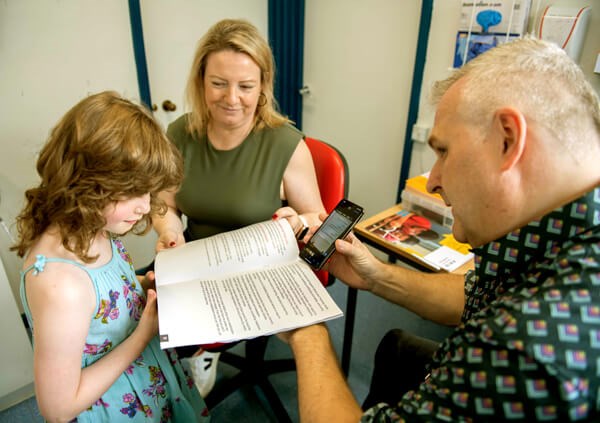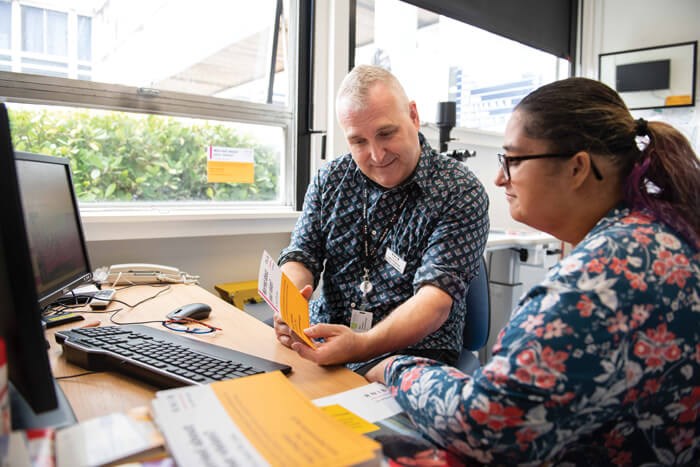With more than 2,000,000 people in the UK living with some degree of sight loss and over 300,000 registered as blind or partially sighted, it is important for anyone living with sight loss to know they’re not alone.
At what can be an incredibly worrying time for patients, even if sight loss is temporary such as with cataracts, support from the right person at the right time can make all the difference. Such support can help reduce the functional, social and emotional impact of the experience, and can be accessed through a vast network by the patient or their family, friends or healthcare provider. This includes:
- Charities such as Glaucoma UK, Guide Dogs, or Blind Veterans UK
- Sport organisations such as British Blind Sports
- Research organisations such as Fight for Sight
- Peer support groups such as Royal National Institute of Blind People (RNIB’s) Talk and Support
- Sensory needs rehabilitation teams
- Technological support
- Services for children and young people, employment, welfare rights and low-vision.
The help a patient may need depends on their situation. Here are two examples:
Scenario one
A patient has been seen by their optometrist and referred to hospital for a suspected eye condition. They may well need advice while waiting. Searching the internet for information about the suspected sight condition is great, but directing them to a safe, reliable source can prevent misunderstandings and unnecessary worry. RNIB’s Waiting Well team support patients with eye health information that is co-authored by the RCOphth and PIF TICK accredited, and direct them to specific organisations for specialist information. Understanding their condition means patients are able to take an active part in the decisions around diagnosis and treatment, and better prepare patients for any potential issues around accessing care, navigating the NHS system, and coping with long waiting times.
Scenario two
A patient is under the care of the hospital eye clinic. They may have questions about their diagnosis, be worried about the future, or they may be living with sight loss and struggling with day-to-day activities. The best route to support is through the Eye Care Liaison Officer (ECLO) in the ophthalmology team. ECLOs are in over 100 eye clinics across the UK providing a bridge between medical teams and the support network outside of the hospital. ECLOs are reachable via phone or face to face in clinic. The patient needn’t be registered as blind, partially sighted or even eligible for this – anyone who needs support can be offered help. ECLOs can refer and signpost to other agencies and are someone to talk to if the patient needs advice, practical support or just a listening ear. An ECLO can go through the registration paperwork and explain its benefits to the patient. In areas with no ECLO service, patients can access support via RNIB’s Sight Loss Advice Service, contactable through RNIB’s Helpline (below). The support covers everything from practical advice, general information and referrals to other agencies through to benefits checking and welfare rights. This extends to all agencies.

ECLO Mark Chapman helping a child read print using a smartphone reading app.

ECLO Mark Chapman showing a patient a leaflet about sight loss.

A woman leaning forward examining different sized text using a magnifier.
Eyecare professionals can receive training and support from RNIB to identify those patients who may benefit from advice and how to get that help for them. Sight Loss Awareness Training e-learning is a CPD-accredited course, full of resources to help you provide better-quality care for your patients, which covers key elements of support services for people with sight loss, as well as the basic principles of low vision. In addition, there are podcasts and webinar options available that cover topics such as making your service accessible, complex needs, dementia and sight loss and stroke.
Whether you are a patient who has a sight condition, a patient who has sight loss, someone who cares for a person with complex needs or an eyecare professional, it is important to remember that getting the right support at the right time can ensure that everyone with sight loss can live happy and fulfilled lives.
For more information
• ‘Waiting to see an eye specialist’ guide:
https://change.rnib.org.uk/
page/133528/data/1
• ‘Worried about your eyes’ information:
www.rnib.org.uk/your-eyes/
worried-about-your-eyes/
• To find out more about ECLOs and all other services, call the RNIB Helpline on 0303 123 9999 (8am–8pm weekdays, 9am–1pm Saturdays).
• Email our Waiting Well team on: rnib.waitingwell@nhs.net
• Access the (free) Sight Loss Awareness Training course by contacting: learningchoices.mailbox.rnib.org.uk
COMMENTS ARE WELCOME





